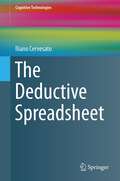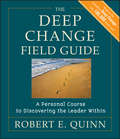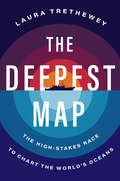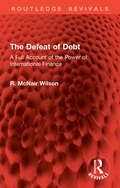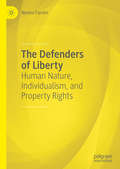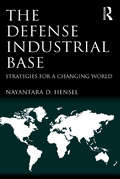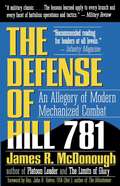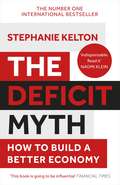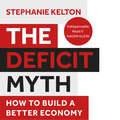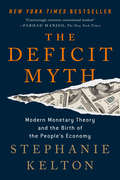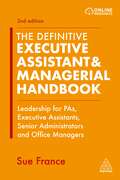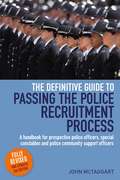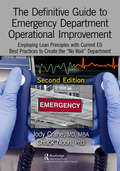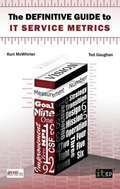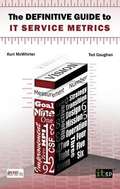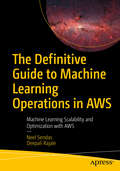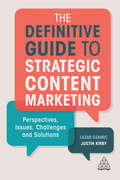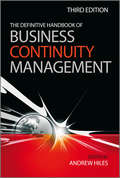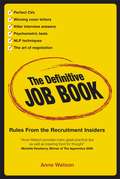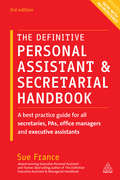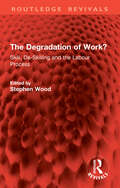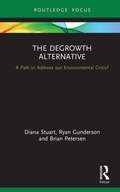- Table View
- List View
The Deductive Spreadsheet
by Iliano CervesatoThis book describes recent multidisciplinary research at the confluence of the fields of logic programming, database theory and human-computer interaction. The goal of this effort was to develop the basis of a deductive spreadsheet, a user productivity application that allows users without formal training in computer science to make decisions about generic data in the same simple way they currently use spreadsheets to make decisions about numerical data. The result is an elegant design supported by the most recent developments in the above disciplines. The first half of the book focuses on the deductive engine that underlies this application, the foundations that users do not see. After giving a mathematical model of traditional spreadsheet applications, we extend them with operators to perform a number of relational tasks, similar to the user view of a database but in a spreadsheet context. Expressing this extension in a logic programming framework is a natural step towards giving it powerful deductive capabilities. The second half of the book deals with the user interface, the part of the application with which the user actually interacts. We review the elements of the graphical user interface of traditional spreadsheet applications and describe practical methodologies for designing user interfaces borrowed from the field of cognitive psychology. We then propose a design that conservatively integrates mechanisms for a user to take advantage of the new deductive capabilities. This is followed by the results of some preliminary usability experiments. The book will appeal to researchers and practitioners in the various areas underlying this work. Researchers will not only find interesting new developments in their domains, but will also learn how to achieve a multidisciplinary focus. Practitioners will find fully developed solutions to numerous problems that are not easily solvable using traditional spreadsheet applications.
The Deep Change Field Guide
by Robert E. QuinnHow to realize your own leadership potential Based on the bestselling book, Deep Change, The Deep Change Field Guide takes readers through the introspective journey of personal transformation. The field guide streamlines, updates, and augments the content of the original book into an interactive self-teaching course that helps readers learn how to become powerful agents of change. Learning tools include reflection questions, film assignments, and action plans that help readers think about the concepts in terms of their own situations, and identify actions to embody the concepts in their lives. The field guide has been carefully designed so that individual learners can gain the same benefits that students have long enjoyed in the author's courses, and the learning tools also lend themselves to both the academic and professional classroom. Complements to Robert Quinn's bestselling book Deep Change Includes exercise, reflective questions, and worksheets throughout Provides reader with a "self-help" guide to overcoming the personal and professional obstacles that prevent transformational leadership For anyone who yearns to be an internally driven leader, to motivate the people around them, and develop a satisfying work life, The Deep Change Field Guide holds the key.
The Deep: Entrepreneurship in the Public Sector (B)
by Amy C. Edmondson Barbara Zepp LarsonSupplement
The Deepest Map: The High-Stakes Race to Chart the World's Oceans
by Laura TretheweyThe dramatic and action-packed story of the last mysterious place on earth—the world’s seafloor—and the deep-sea divers, ocean mappers, marine biologists, entrepreneurs, and adventurers involved in the historic push to chart it, as well as the opportunities, challenges, and perils this exploration holds now and for the future.Five oceans—the Atlantic, the Pacific, the Indian, the Arctic, and the Southern—cover approximately 70 percent of the earth. Yet we know little about what lies beneath them. By the early 2020s, less than twenty-five percent of the ocean’s floor has been charted, most close to shorelines, and over three quarters of the ocean lies in in what is called the Deep Sea, depths below a thousand meters. Now, the race is on to completely map the ocean’s floor by 2030—an epic project involving scientists, investors, militaries, and private explorers who are cooperating and competing to get an accurate reading of this vast terrain and understand its contours and environment. In The Deepest Map, Laura Trethewey documents this race to the bottom, following global efforts around the world, from crowdsourcing to advances in technology, recent scientific discoveries to tales of dangerous dives in untested and costly submersibles. The lure of ocean exploration has attracted many, including the likes of James Cameron, Richard Branson, Ray Dalio, and Eric Schmidt. The Deepest Map follows a cast of intriguing characters, from early mappers such as Marie Tharp, a woman working in the male-dominated fields of oceanography and geology whose discoveries have added significantly to our knowledge; Victor Vescovo, a man obsessed with reaching the deepest depths of each of the five oceans, and his young, brilliant, and fearless mapper Cassie Bongiovanni; and the diverse entrepreneurs looking to explore and exploit this uncharted territory and its resources.In The Deepest Map, ocean discovery converges with humanity's origin story; in mapping the ocean floor, scientists are actively tracing our roots back to the most inhospitable places on earth where life began—and flourished. But for every conservationist looking to protect the seafloor, there are others who see its commercial potential. Will a new map exacerbate pollution and the degradation of this natural resource? How will the race remake political power structures in years to come? Trethewey probes these questions as countries and conglomerates wrestle over the riches that may lie at the bottom of the sea.The future of humanity depends on our ability to protect this vast, precious, and often ignored resource. A true tale of science, nature, technology, and an extreme outdoor adventure The Deepest Map illuminates why we love—and fear—the earth’s final frontier and is a crucial addition to the increasingly urgent conversation about climate change.
The Defeat of Debt: A Full Account of the Power of International Finance (Routledge Revivals)
by R. McNair WilsonPrior to World War I, international trade was conducted based on what is known as the classical gold standard. In this system, trade between nations was settled using physical gold. Nations with trade surpluses accumulated gold as payment for their exports. Conversely, nations with trade deficits saw their gold reserves decline as gold flowed out of those nations as payment for their imports, creating debt laden economies, particularly for those countries impacted industrially by the First World War. In 1934, President Roosevelt signed the Gold Reserve Act which transferred the title of gold from private holders to the U.S. Treasury. The legislation successfully stopped the outflow of gold during the Great Depression. Originally published in 1935 this book discusses Roosevelt’s actions and their consequences for the world economy as well as global democracy.
The Defenders of Liberty: Human Nature, Individualism, and Property Rights
by Neema ParviniThe Defenders of Liberty presents a history of economic liberalism from the Renaissance to the present. It chronicles the tradition of thought that sees human nature as social yet self-interested, methodological individualism as its key analytical tool, and property rights as foundational to a civilised society. In the development of this way of thinking, it considers the contributions of many key thinkers including Niccolò Machiavelli, Thomas Hobbes, John Locke, Richard Cantillon, A.J.R. Turgot, David Hume, Adam Smith, Nassau William Senior, Richard Cobden, Herbert Spencer, Jean-Baptiste Say, Carl Menger, William Stanley Jevons, Gaetano Mosca, Eugen Böhm-Bawerk, Vilfredo Pareto, Phillip Wicksteed, Edwin Cannan, Ludwig von Mises, Lionel Robbins, F.A. Hayek, W.H. Hutt, Milton Friedman, George Stigler, Murray N. Rothbard, James M. Buchanan, and Thomas Sowell. The book contends that liberalism needs to be grounded in realism, and that it has been derailed whenever economists have deviated from an explicitly realist understanding of human nature, individualism and property rights. It argues that the cause of liberalism was compromised by errors in economic reasoning by such major figures as David Ricardo, John Stuart Mill, Alfred Marshall, A.C. Pigou, and John Maynard Keynes. In diagnosing what has gone wrong for liberalism in the twenty-first century, The Defenders of Liberty argues against substituting mathematical abstraction for causal realism; it opposes interventionist central banking; it seeks to recover economic liberalism from social and political liberalism, which are somewhat unrelated schools of thought; it resists a view of human nature rooted in selfishness or atomised individualism; and finally alerts defenders of freedom to the ruthless but effective language games played by their opponents. This book will be of interest to the educated general reader as well as undergraduates and postgraduates in disciplines such as economics, political theory and philosophy.
The Defense Industrial Base: Strategies for a Changing World
by Nayantara HenselThe US and international defense industrial sectors have faced many challenges over the last twenty years, including cycles of growth and shrinkage in defense budgets, shifts in strategic defense priorities, and macroeconomic volatility. In the current environment, the defense sector faces a combination of these challenges and must struggle with the need to maintain critical aspects of the defense industrial base as defense priorities change and as defense budgets reduce or plateau. Moreover, the defense sector in the US is interconnected both with defense sectors in other countries and with other industry sectors in the US and global economies. As a result, strategic decisions made in one defense sector impact the defense sectors of other countries, as well as other areas of the economy. Given her academic, corporate, and Department of Defense experience as a leading economist and policy-maker, Dr. Nayantara Hensel is perfectly positioned to examine the interrelationship between these forces both historically and in the current environment, and to assess the implications for the future global defense industrial base.
The Defense of Hill 781: An Allegory of Modern Mechanized Combat
by James R. Mcdonough John R. GalvinIn the tradition of the humorous classic Defense of Duffer's Drift, our hero's escape lies in completing a successful mission.
The Deficit Myth: Modern Monetary Theory and How to Build a Better Economy
by Stephanie KeltonTHE INTERNATIONAL BESTSELLER'Kelton has succeeded in instigating a round of heretical questioning, essential for a post-Covid-19 world, where the pantheon of economic gods will have to be reconfigured' Guardian'Stephanie Kelton is an indispensable source of moral clarity ... the truths that she teaches about money, debt, and deficits give us the tools we desperately need to build a safe future for all' Naomi Klein'Game-changing ... Read it!' Mariana Mazzucato'A rock star in her field' The Times'This book is going to be influential' Financial Times'Convincingly overturns conventional wisdom' New York TimesSupporting the economy, paying for healthcare, creating new jobs, preventing a climate apocalypse: how can we pay for it all? Leading economic thinker Stephanie Kelton, shows how misguided that question is, and how a radical new approach can maximise our potential as a society. Everything that we've been led to believe about deficits and the role of money and government spending is wrong. Rather than asking the self-defeating question of how to pay for the crucial improvements our society needs, Kelton guides us to ask: which deficits actually matter?
The Deficit Myth: Modern Monetary Theory and How to Build a Better Economy
by Stephanie Kelton'Game-changing ... Read it!' - Mariana MazzucatoIn a world of epic, overlapping crises, Stephanie Kelton is an indispensable source of moral clarity ... the truths that she teaches about money, debt, and deficits give us the tools we desperately need to build a safe future for all. Read it - then put it to use. - Naomi KleinThe leading thinker and most visible public advocate of modern monetary theory - the freshest and most important idea about economics in decades - delivers a radically different, bold, new understanding for how to build a just and prosperous society.Any ambitious proposal - ranging from fixing crumbling infrastructure to Medicare for all or preventing the coming climate apocalypse - inevitably sparks questions: how can we afford it? How can we pay for it? Stephanie Kelton points out how misguided those questions really are by using the bold ideas of modern monetary theory (MMT), a fundamentally different approach to using our resources to maximize our potential as a society.We've been thinking about government spending in the wrong ways, Kelton argues, on both sides of the political aisle. Everything that both liberal/progressives and conservatives believe about deficits and the role of money and government spending in the economy is wrong, especially the fear that deficits will endanger long-term prosperity.Through illuminating insights about government debt, deficits, inflation, taxes, the financial system, and financial constraints on the federal budget, Kelton dramatically changes our understanding of how to best deal with important issues ranging from poverty and inequality to creating jobs and building infrastructure. Rather than asking the self-defeating question of how to pay for the crucial improvements our society needs, Kelton guides us to ask: which deficits actually matter? What is the best way to balance the risk of inflation against the benefits of a society that is more broadly prosperous, safer, cleaner, and secure?With its important new ways of understanding money, taxes, and the critical role of deficit spending, MMT busts myths that prevent us from taking action because we can't get beyond the question of how to pay for it. 'The best book on rethinking economics that anyone will find right now.' - Richard Murphy, Political Economist and author of The Joy of Tax (P)2020 Hachette Audio
The Deficit Myth: Modern Monetary Theory and the Birth of the People's Economy
by Stephanie KeltonA New York Times BestsellerThe leading thinker and most visible public advocate of modern monetary theory -- the freshest and most important idea about economics in decades -- delivers a radically different, bold, new understanding for how to build a just and prosperous society.Stephanie Kelton's brilliant exploration of modern monetary theory (MMT) dramatically changes our understanding of how we can best deal with crucial issues ranging from poverty and inequality to creating jobs, expanding health care coverage, climate change, and building resilient infrastructure. Any ambitious proposal, however, inevitably runs into the buzz saw of how to find the money to pay for it, rooted in myths about deficits that are hobbling us as a country.Kelton busts through the myths that prevent us from taking action: that the federal government should budget like a household, that deficits will harm the next generation, crowd out private investment, and undermine long-term growth, and that entitlements are propelling us toward a grave fiscal crisis.MMT, as Kelton shows, shifts the terrain from narrow budgetary questions to one of broader economic and social benefits. With its important new ways of understanding money, taxes, and the critical role of deficit spending, MMT redefines how to responsibly use our resources so that we can maximize our potential as a society. MMT gives us the power to imagine a new politics and a new economy and move from a narrative of scarcity to one of opportunity.
The Definitive Executive Assistant & Managerial Handbook: Leadership for PAs, Executive Assistants, Senior Administrators and Office Managers
by Sue FranceWINNER: PA Voice Awards 2015 - Best Book for a PA (1st edition) With the world of work profoundly disrupted by artificial intelligence, machine learning and COVID-19, the role of the executive assistant is changed forever. Learn how to respond to these challenges and help create 'the better normal' while developing the leadership skills necessary to thrive in a senior administrative position. From bestselling author and expert Sue France, The Definitive Executive Assistant & Managerial Handbook is the ultimate guide to management in the context of an administrative role. Placing an emphasis on both personal leadership and practical skills, this new edition of the award-winning book teaches readers to manage a team, develop the emotional intelligence to understand their colleagues, negotiate effectively and confidently manage a project. Equipped with these tools, readers will be ready to steer their teams to organizational success in any situation. With new sections on best practice for managing remote workers and building a responsible relationship with new technologies, The Definitive Executive & Managerial Handbook is an indispensable guide for both ambitious PAs aiming for promotion and senior assistants who want to improve their skills.
The Definitive Guide To Passing The Police Recruitment Process (2nd Edition): A handbook for prospective police officers, special constables and police community support officers
by John McTaggartThis book has been written with one very specific objective in mind. It aims to give you, the reader, an in-depth appreciation of the skills and abilities required to pass the police national recruitment tests, including the process for applying to be a Police Community Support Officer (PCSO). <P><P>As you read through this book, you will see the approach is to explain in detail the reasoning and rationale behind each exercise, the mechanics of how each exercise works, and the various limitations that exist within the exercise itself – from the perspective of those who designed it. It is not about making you a better person, although if you follow the principles contained throughout, you may just end up that way! <P> In essence, this book is a ‘how to’ guide to passing the police recruitment system. It aims to give you the best chance of passing through the process successfully.
The Definitive Guide To Passing The Police Recruitment Process 2nd Edition: A handbook for prospective police officers, special constables and police community support officers
by John MctaggartEvery police force in England and Wales uses the same national application form and assessment centre. This book tells you not just about the process, but what you need to do to impress the assessors. Now in a revised new edition to reflect the recent changes in the six core skills by which all police applicants are assessed, it provides:
The Definitive Guide to Emergency Department Operational Improvement: Employing Lean Principles with Current ED Best Practices to Create the “No Wait” Department, Second Edition
by Jody Crane, MD, MBA Chuck Noon, PhDThis revised and updated book explores the academics behind managing the complex service environment that is the Emergency Department (ED) by combining applied management science and practical experiences to create a model of how to improve operations. This book offers a presentation of Lean tools used in the ED along with basic and advanced flow principles. It then shows how these concepts are applied and why they work, supported by case studies in which Lean principles were used to transform an underperforming ED into a world-class operation. After reviewing best practices, the authors explain how to achieve excellence by discussing the elements of creating a culture of change.
The Definitive Guide to IT Service Metrics
by Kurt Mcwhirter Ted GaughanIT service metrics: Manage them. Measure them. Make them work for you. Measuring success is crucial, but how do we do it? How can we be sure that the IT services we offer are adding real value to our business? Metrics are an invaluable tool for measuring the effectiveness of IT service provision. Used effectively, metrics enable businesses to assess performance in order to inform the decision-making process, drive change and realize improvements. They facilitate cost savings through economical use of finance and resources, and ensure that the services provided are appropriate - thereby strengthening customer loyalty. Based on ITIL(R) and other service management frameworks and standards Up-to-date, based on the ITIL(R) framework, as well as COBIT(R), ISO/IEC 20000, PMI(R) and ISO/IEC 27000, The Definitive Guide to IT Service Metrics will show you how to integrate metrics into your business and maximize their usage and effectiveness. You will learn what to consider when gathering and reporting information and how to secure and protect your company's metrics. Use metrics to benefit your IT department and the business as a whole Used just as they are, the metrics in this book will bring many benefits to both the IT department and the business as a whole. Details of the attributes of each metric are given, enabling you to make the right choices for your business. You may prefer and are encouraged to design and create your own metrics to bring even more value to your business - this book will show you how to do this, too. About the authors Kurt McWhirter is a recognized authority on using the ITIL(R) framework and has more than 30 years' experience in IT strategic planning, operations management, and enterprise process design and implementation. He is certified as an ITIL(R) Expert and ISO/IEC 20000 Consultant and is an accredited ITIL(R) Trainer. Ted Gaughan has more than 25 years' experience in business/technical strategic development, program/project management, and IT engineering and operations management. He is a certified Project Management Professional (PMP(R)), Process Design Engineer (CPDE(R)), ITIL(R) Expert, ISO/IEC 20000 Consultant and TIPAiE Lead Assessor. The definitive guide you can't afford to be without!
The Definitive Guide to IT Service Metrics
by Kurt Mcwhirter Ted GaughanIT service metrics: Manage them. Measure them. Make them work for you. Measuring success is crucial, but how do we do it? How can we be sure that the IT services we offer are adding real value to our business? Metrics are an invaluable tool for measuring the effectiveness of IT service provision. Used effectively, metrics enable businesses to assess performance in order to inform the decision-making process, drive change and realize improvements. They facilitate cost savings through economical use of finance and resources, and ensure that the services provided are appropriate - thereby strengthening customer loyalty. Based on ITIL(R) and other service management frameworks and standards Up-to-date, based on the ITIL(R) framework, as well as COBIT(R), ISO/IEC 20000, PMI(R) and ISO/IEC 27000, The Definitive Guide to IT Service Metrics will show you how to integrate metrics into your business and maximize their usage and effectiveness. You will learn what to consider when gathering and reporting information and how to secure and protect your company's metrics. Use metrics to benefit your IT department and the business as a whole Used just as they are, the metrics in this book will bring many benefits to both the IT department and the business as a whole. Details of the attributes of each metric are given, enabling you to make the right choices for your business. You may prefer and are encouraged to design and create your own metrics to bring even more value to your business - this book will show you how to do this, too. About the authors Kurt McWhirter is a recognized authority on using the ITIL(R) framework and has more than 30 years' experience in IT strategic planning, operations management, and enterprise process design and implementation. He is certified as an ITIL(R) Expert and ISO/IEC 20000 Consultant and is an accredited ITIL(R) Trainer. Ted Gaughan has more than 25 years' experience in business/technical strategic development, program/project management, and IT engineering and operations management. He is a certified Project Management Professional (PMP(R)), Process Design Engineer (CPDE(R)), ITIL(R) Expert, ISO/IEC 20000 Consultant and TIPAiE Lead Assessor. The definitive guide you can't afford to be without!
The Definitive Guide to Machine Learning Operations in AWS: Machine Learning Scalability and Optimization with AWS
by Neel Sendas Deepali RajaleForeword by Dr. Shreyas Subramanian, Principal Data Scientist, Amazon This book focuses on deploying, testing, monitoring, and automating ML systems in production. It covers AWS MLOps tools like Amazon SageMaker, Data Wrangler, and AWS Feature Store, along with best practices for operating ML systems on AWS. This book explains how to design, develop, and deploy ML workloads at scale using AWS cloud's well-architected pillars. It starts with an introduction to AWS services and MLOps tools, setting up the MLOps environment. It covers operational excellence, including CI/CD pipelines and Infrastructure as code. Security in MLOps, data privacy, IAM, and reliability with automated testing are discussed. Performance efficiency and cost optimization, like Right-sizing ML resources, are explored. The book concludes with MLOps best practices, MLOPS for GenAI, emerging trends, and future developments in MLOps By the end, readers will learn operating ML workloads on the AWS cloud. This book suits software developers, ML engineers, DevOps engineers, architects, and team leaders aspiring to be MLOps professionals on AWS. What you will learn: ● Create repeatable training workflows to accelerate model development ● Catalog ML artifacts centrally for model reproducibility and governance ● Integrate ML workflows with CI/CD pipelines for faster time to production ● Continuously monitor data and models in production to maintain quality ● Optimize model deployment for performance and cost Who this book is for: This book suits ML engineers, DevOps engineers, software developers, architects, and team leaders aspiring to be MLOps professionals on AWS.
The Definitive Guide to Strategic Content Marketing: Perspectives, Issues, Challenges and Solutions
by Lazar Dzamic Justin KirbyMarketers everywhere are talking about content, but not everyone is saying the same thing. Some professionals love content and believe it has revolutionized the practice of marketing. To others, it's mere hype: a new name for what marketers have always done. The Definitive Guide to Strategic Content Marketing brings together all of these diverse perspectives, structuring them around useful key topics that provide insight into the multi-faceted nature of content marketing. The editors of The Definitive Guide to Strategic Content Marketing weave different voices together to present a balanced view of content marketing, grouping the discussion around relevant subjects such as content monetization, native advertising, visuals vs video, and the challenge of measuring results. This structure allows readers to move through the book according to their interests, and cherry-pick the most useful aspects of each discussion to apply to their own marketing initiatives. Containing contributions from, and interviews with, leading academics, industry experts, thought leaders and influencers, this book is a truly unique resource.
The Definitive Handbook of Business Continuity Management
by Andrew HilesWith a pedigree going back over ten years, The Definitive Handbook of Business Continuity Management can rightly claim to be a classic guide to business risk management and contingency planning, with a style that makes it accessible to all business managers. Some of the original underlying principles remain the same - but much has changed. This is reflected in this radically updated third edition, with exciting and helpful new content from new and innovative contributors and new case studies bringing the book right up to the minute.This book combines over 500 years of experience from leading Business Continuity experts of many countries. It is presented in an easy-to-follow format, explaining in detail the core BC activities incorporated in BS 25999, Business Continuity Guidelines, BS 25777 IT Disaster Recovery and other standards and in the body of knowledge common to the key business continuity institutes.Contributors from America, Asia Pacific, Europe, China, India and the Middle East provide a truly global perspective, bringing their own insights and approaches to the subject, sharing best practice from the four corners of the world.We explore and summarize the latest legislation, guidelines and standards impacting BC planning and management and explain their impact.The structured format, with many revealing case studies, examples and checklists, provides a clear roadmap, simplifying and de-mystifying business continuity processes for those new to its disciplines and providing a benchmark of current best practice for those more experienced practitioners.This book makes a massive contribution to the knowledge base of BC and risk management. It is essential reading for all business continuity, risk managers and auditors: none should be without it.
The Definitive Job Book
by Anne WatsonThere are few books available which cover the full job-searching, application, interview and negotiation process. The Definitive Job Book is just that - it covers every single aspect of job-hunting in seven chapters. Each chapter includes 'advice from the inside' interviews with HR and recruitment specialists and 'I've been there too' interviews with people who have successfully navigated the recruitment minefield. The Definitive Job Book Is an essential reference for anyone - from graduates starting out, to senior executives seeking a change - to the job-hunting process. You will need only THIS book to get the job of your dreams.
The Definitive Personal Assistant & Secretarial Handbook
by Sue FranceWritten by a former Times Crème PA of the Year, this new edition of The Definitive Personal Assistant and Secretarial Handbook is the ultimate guide for all management assistants, PAs, secretaries and executive assistants. Administrative personnel in today's workplace hold an immense influence, not only on their bosses' performance, but also on the running of the whole organisation. This best-selling book is the only resource needed to excel in one's role as an assistant, outshine bosses' expectations and go up the ladder. Placing special emphasis on career development and learning, it provides help and advice on the skills necessary to progress in your career. Along with a chapter to share with your boss for a more fruitful working relationship, it includes help with time management, networking, relationship management, communication and confidence. Now with a new chapter on how to use neuroscience tools to coach yourself through your weaknesses and primed behavioural traits, it also contains even more practical help with minute taking, telephone and mobile communication etiquette and presentation skills. With free downloadable online resources to aid the day-to-day running of your office, this comprehensive and accessible guide will help you keep your finger on the pulse and maintain your professional image.
The Degradation of Work?: Skill, De-Skilling and the Labour Process (Routledge Revivals)
by Stephen WoodOriginally published in 1982 and now reissued with a new Preface by Stephen Wood the contributors of this book discuss the issues surrounding the organization of labour. They use insights from industrial sociology, historical research and Marxist-Feminist debates. In particular they stress that work organization cannot be seen simply as a reflection of the strategy of an omniscient management; any examination of it must involve product and labour markets, technology, trade unionism and, above all, the way in which production systems are jointly created out of the interrelationship between management and workforces. The Degradation of Work? asks if there has been a general de-skilling and routinization of jobs and if ‘skilled’ jobs are really any different from semi-skilled or unskilled ones.
The Degrowth Alternative: A Path to Address our Environmental Crisis? (Routledge Studies in Ecological Economics)
by Diana Stuart Ryan Gunderson Brian PetersenDegrowth is a planned economic contraction in wealthy countries that reduces production and consumption—and, by extension, greenhouse gas emissions and stresses on global ecosystems—to sustainable levels within ecological limits. This book explores the idea of degrowth as an economic alternative to offer a more sustainable and just future. A growing number of scientists and scholars now recognize that a system that continues to prioritize economic growth will prevent us from effectively addressing the dual environmental crises of climate change and biodiversity loss. To establish the case for degrowth, the text opens by posing critical questions about our current system and identifying its limitations, as well as discussing the ineffectiveness of "false solutions" that seem to offer something new but would actually preserve the status quo. The concept of degrowth is then fully introduced along with a discussion of core principles and goals as well as major critiques and questions. The book explores what living in a degrowth society would entail and the policies needed to support degrowth. Finally, the work concludes by examining the opportunities and challenges for degrowth and a successful transition to a sustainable steady-state economy. This book provides an advanced introduction to the environmental issues around degrowth for students, scholars and activists interested in economic alternatives, sustainability and the environment.
